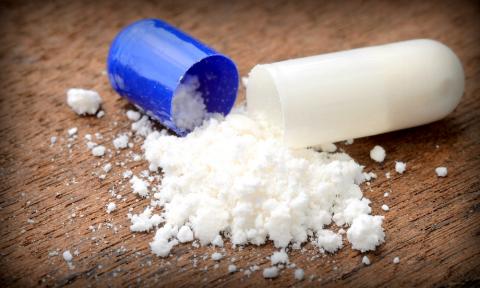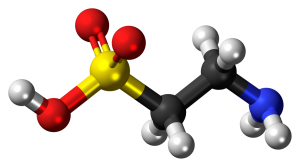Understand why your cat needs taurine every day, and how to make sure he gets enough...

Taurine in cats: Should I supplement my cat’s diet with taurine?
Taurine in cats is a topic that is gaining momentum with cat owners at the moment. We have started to experiment with taurine supplementation to see if it appears to make any visible difference. If you raw feed your cats, then you will definitely need to supplement them with some form of taurine, as well as other nutrients. If you are considering raw feeding, please read this first for some important news. Always speak to your veterinarian before changing your cat’s diet, or adding any supplements to it.
What is taurine?
Taurine is a naturally occurring organic compound that is found in animal tissues. It is needed by a wide variety of species, including humans and cats. Here is an image of a taurine molecule:

Why do cats need taurine in their diet?
Cats are not capable of producing taurine from other materials. This means that if they do not consume it in their diet, they will not have any taurine available to their body tissues. Cats require taurine every day: taurine cannot be stored so if a cat consumes more taurine that is needed that day, the excess taurine is excreted in the urine...it is not stored to be used at a later date. Cats need taurine for a number of essential purposes:
-
For healthy eyes: a lack of daily taurine can cause a cat’s retinas to degenerate, leading to blindness. This condition is called Central Retinal Degeneration (CRD). Once the damage is done, it cannot be reversed by taurine supplementation, but it can be prevented from progressing any further.
-
For a healthy heart: a lack of taurine can lead to a thickening of the heart wall, leading to a heart murmur and heart disease. Fortunately as long as this is detected reasonably early on, the damage can be reversed by appropriate taurine supplementation.
-
To keep hair healthy and prevent hair loss
-
To prevent tooth decay
Signs of low taurine in cats therefore include: malting, rough fur, tooth decay and any signs of eye degeneration or heart disease (surprisingly, coughing is a sign of heart disease in cats).
Taurine in cats: pregnancy and healthy kittens
Taurine is particularly essential during pregnancy as the growing foetuses also require taurine to develop correctly. A lack of taurine during pregnancy can lead to spontaneous abortion of some or all of the foetuses and low birth weight kittens.
Taurine in cats: nursing queens and healthy kittens
-
It has been reported that Flat Chested Kitten Syndrome (FCKS) can be prevented and treated by supplementing the mother with taurine.
-
FCKS is a condition in which the kitten’s lungs suddenly deflate. If not treated immediately this leads to the bony structures around the chest (the rib cage) growing improperly.
-
We have no direct experience of treating FCKS, but please see the very informative website Rameses Tonkinese for further information if you are dealing with FCKS: How to treat FCKS
How much taurine should I give my cat?
If you search the internet, you will discover many different opinions on the level of taurine supplementation for a cat. There is no absolutely clear answer. Here are some guidelines:
-
The Association of American Feed Controls (AAFCO) has stipulated that any approved dry cat food should be at least 0.1% taurine and any wet food should be at least 0.2%
-
A recent study by Burger and Barnett called ‘The taurine requirement of the cat’ in the Journal of Small Animal Practice concluded that a cat requires 10mg of taurine per kg of bodyweight per day. So a 5kg cat would require 50mg of taurine each day.
-
The form in which the taurine is consumed is also thought to have an effect: taurine in wet food appears to be less effective which is why AAFCO require wet food to have twice the taurine of dry foods.
Experimenting with taurine in cats
As you can see, the question of how much taurine your cat should have each day is far from conclusively settled. It is said that a good quality complete cat food should have enough taurine included in it to be sufficient for your cat. We use very good quality food that should contain enough taurine to meet our cats’ daily needs. However, these foods may not have sufficient taurine in for pregnant and nursing queens.
Recently we had a litter of kittens that were a little under average weight. Whilst all of the kittens gained weight well and attained normal weights quickly, it led us down a path of research into nutrition and taurine supplementation. When we started reading about the symptoms of low taurine, we also noticed that mum was malting a bit more than usual and her fur was a little rough. These things are generally considered to be normal for pregnant and lactating mothers...but it made us wonder if they actually just need some additional taurine because pregnancy and nursing requires more of it.
We are now supplementing our pregnant and lactating queens with taurine and recording the results to try and determine whether additional taurine supplementation will make any difference.
Forms of taurine for cats
Taurine in cats can be provided by using powdered taurine or liquid taurine. It can also be provided by giving your cat natural food sources that are very high in taurine, such as heart meat. We are using powdered taurine for two main reasons:
- firstly the powdered form is readily available and will allow us to measure how much taurine we have given our cats.
- secondly, we do not raw feed our cats (we have done a lot of research on the topic of raw feeding and at present we have not found any evidence that there are any real benefits, but there is evidence of bacterial illness caused by raw feeding.....we continue to review the evidence and are always open to changing our conclusions...but that is all in another article!)
We are hoping to gather some real information about taurine in cats. Watch this space for the results...
If you have any experience of supplementing your cats with taurine, particularly pregnant and lactating queens, or kittens with FCKS, please contact us to share it with us.
Read more...
- Dry cat food reviews (showing how much taurine is in each food)
- Wet cat food reviews (also with taurine amounts)
- Swimmer Syndrome and how to fix it
Find out if we have any British Shorthair kittens available